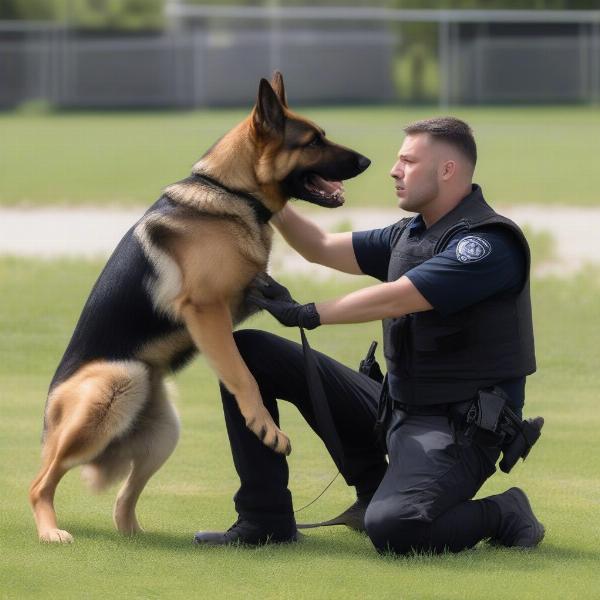Police force dog handlers play a vital role in maintaining law and order. They work with highly trained dogs to perform a variety of tasks, from searching for missing persons to apprehending criminals. This in-depth guide explores the world of police force dog handlers, covering their training, responsibilities, the special bond they share with their canine partners, and the challenges they face.
The Making of a Police Force Dog Handler
Becoming a police force dog handler isn’t just a job; it’s a calling. It requires dedication, patience, and a genuine love for dogs. Aspiring handlers typically begin their careers as police officers, demonstrating aptitude and interest before applying for the specialized K9 unit. The selection process is rigorous, involving physical and mental assessments, as well as interviews. Successful candidates then undergo intensive training, learning about canine behavior, obedience training, scent detection, and apprehension techniques. This training is ongoing throughout a handler’s career, ensuring they and their canine partners remain at the top of their game.
 Police Dog Handler Training with a German Shepherd
Police Dog Handler Training with a German Shepherd
Responsibilities of a Police Force Dog Handler
The daily responsibilities of a police force dog handler are varied and demanding. They involve caring for their canine partner, which includes feeding, grooming, and ensuring their overall well-being. Beyond the care aspect, handlers conduct regular training sessions to maintain and enhance their dog’s skills. This training can include obedience drills, scent work practice, and simulated scenarios that mirror real-world situations. On duty, handlers and their dogs respond to a wide range of calls, from searching for drugs and explosives to tracking suspects and assisting in crowd control. The work is often physically demanding and can involve exposure to dangerous situations.
The Bond Between Handler and Dog
The relationship between a police force dog handler and their dog goes beyond a professional partnership; it’s a deep bond of trust and mutual respect. Handlers spend countless hours with their dogs, both on and off duty, forming a connection that is essential for effective teamwork. This bond is built on understanding, communication, and unwavering support. Handlers learn to read their dog’s subtle cues, anticipating their reactions and ensuring their safety in stressful situations. The dogs, in turn, rely on their handlers for guidance, protection, and affection.
Challenges Faced by Police Force Dog Handlers
Being a police force dog handler is undoubtedly rewarding, but it also presents significant challenges. The work can be emotionally and physically taxing, requiring long hours and exposure to traumatic situations. Handlers must maintain a high level of vigilance and be prepared to make split-second decisions that can have life-or-death consequences. Furthermore, the constant worry about their dog’s safety adds another layer of stress. Despite these challenges, the dedication and passion of police force dog handlers remain unwavering, driven by their commitment to serve and protect.
What are the physical requirements for becoming a police dog handler?
Physical fitness is crucial. Handlers need to be able to keep up with their dogs, navigate various terrains, and handle physically demanding situations.
How long does it take to train a police dog?
Training varies, but it typically takes several months of intensive work to prepare a dog for police work. dog training bite sleeve is often used in this training.
What breeds are commonly used as police dogs?
Breeds like German Shepherds, Belgian Malinois, and Dutch Shepherds are popular choices due to their intelligence, athleticism, and trainability. how to become a dog handler police will provide more information on this topic.
Conclusion
Police force dog handlers represent a unique blend of courage, compassion, and skill. Their dedication, combined with the exceptional abilities of their canine partners, makes them an invaluable asset to law enforcement agencies worldwide. They face numerous challenges, yet their commitment to protecting their communities remains steadfast. If you are interested in a career that combines a love for dogs with a desire to serve, the role of a police force dog handler might be the perfect fit. dog on patrol can be a rewarding experience for both the handler and the dog.
FAQ
- What qualifications do I need to become a police dog handler? Typically, you need to be a serving police officer with a clean record and a demonstrated interest in working with dogs.
- Is it dangerous being a police dog handler? The job can be dangerous, as it involves dealing with potentially violent situations.
- How much time does a handler spend with their dog? Handlers spend a significant amount of time with their dogs, both on and off duty. They are responsible for the dog’s care 24/7.
- What happens to police dogs when they retire? Many police dogs retire to live with their handlers, enjoying a well-deserved rest after years of service.
- Can any dog become a police dog? No, only certain breeds with specific traits and temperaments are suitable for police work.
- Do police dogs get injured on the job? Like their human counterparts, police dogs can get injured in the line of duty.
- How are police dogs trained to detect different substances? They are trained using specialized methods and rewards-based systems to associate specific scents with rewards. hot dog handlers crossword clue might give you an idea of the dedication required.
ILM Dog is a leading international website dedicated to providing comprehensive information and resources for dog lovers worldwide. We cover a wide range of topics, from breed selection and healthcare to training, nutrition, grooming, and product reviews like the music dog toy. Our expert advice caters to all levels of experience, empowering you to provide the best possible care for your canine companion. For any inquiries or further assistance, please contact us via email at [email protected] or phone at +44 20-3965-8624. Visit ILM Dog today for all your dog-related needs!